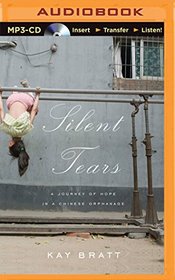This book has important content but misrepresents information due to a ethnocentic way of looking at the Chinese people. This book represents a old wineskin of world missions, "the suffering missionary". This old shows an old breed of missionaries go into a culture without an understanding of how to love someone who has grown up in a completly different culture then him/ her self. They don't bond with the people and then precede to misinterpret the hearts and intents of the people the have come to serve, they thus become sceptical, critical, and untrusting. Me and many others also live in China and even work with the same issues as the author. We have many of the same things happen to us--such as people staring at us--but we interpret these actions through the cultural lense of collectivism. These people are not being rude, the are simply curious. They are taught all thier life that it is ok to do these kinds of things, whereas, we from the west are taught staring is rude.
My biggest complaint of the book is that it paints the chinese in a terrible light.
The author then author then has the audacity to share an experience of how she gave a pillow to one of these "heartless" ayas to show how she cares not only for the babies but the ayas too. Preceeding to say many bad things about these ladies in the next few sentances. Such as her description of the women Tilly helps to describe the picture she is painting on the Chinese people; "Tilly is a big, menacing women who looks as though she could play football if she chose. She has a large head and a butchered hairstyle and she sweats all the time. Her eyes remind me of a snake's and she looks so mean it scares me. When she returns the babies from their baths, she dumps them from 5 inches off the ground so their heads thump on impact. I think she takes pleasure in this, smirking as she abruptly turns and stomps away. I can only hope she gets transfered to another part of the orphanage where she does not have contact with such innocent and helpless little children."
CONSLUSION:
I think her writing is just horrid. Even for a journal style narrative. The narrator is self centered “100% morally superior” Godly character perpetually virtue signaling. And annoying the heck out of the Ayas and the readers alike. I travel a lot and see some harsh realities but instead of putting my self in the center I try to disappear. It’s the best way to learn what is not obvious. Not the author. She is always in the center. The perfection that puts up a mirror to all she considers amoral or wrong by her superior standards.
I think she is deliberately displaying the (10%) of the worst she has seen in her time in China without balancing it with the good (90%). Every place has harsh reality. But some greatness too.
After reading this muddy rubbish one feels like all the Chinese people are cruel heartless monsters that relish in inflicting pain. In their dark land of suffering, filth and death. With total lack of education, amenities or western comforts. In one sentence, one leaves this book thinking the Chinese live in the dark ages of the fifth century.




